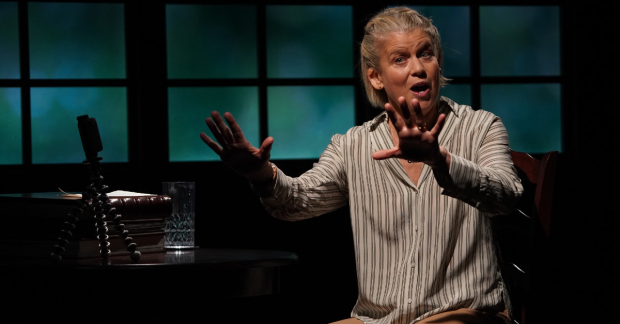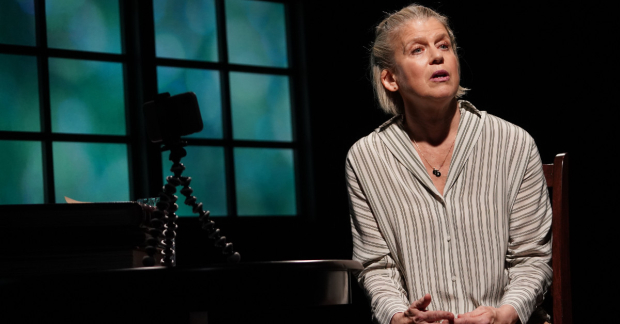Review: The Wife of a Supreme Court Justice Turns a Blind Eye to Her Husband's Past in Jack Was Kind

(© Carol Rosegg)
Just how much do you know about your spouse or partner? And if you learn that they've done something horrible, do you stand by them? These are a couple of the questions that a woman named Mary asks herself in Jack Was Kind, a solo play written and performed by Tracy Thorne at Irish Repertory Theatre.
It's not till late in this 80-minute monologue (first produced as a livestream in 2020) that we learn Mary is married to a US Supreme Court Justice named Jack, who 10 years earlier was accused by a woman of, presumably, sexually assaulting her while both he and she were high school students, though Mary never gets into the exact nature of the alleged crime. The hearing was televised, everyone saw it, and Jack was exonerated. We know the facts.
Of course, we don't really know the facts, since the play is "a work of my imagination," as Thorne says in a program note, "my imagination profoundly provoked." But the circumstances of Jack's case are familiar in a ripped-from-the-headlines sort of way. Nevertheless, Thorne's play runs the risk of seeming like a tiresome writing exercise that lacks any real blood and guts to keep us engaged.
Thorne sidesteps this danger somewhat by making her play less about Jack than about Mary and her response (or rather lack of response) to what her husband, despite being cleared, has probably done. We see her seated at a respectable wooden table in a windowed room (set design by David Esler) adjusting her cellphone on a tripod as she gets ready to record herself. We realize at once that what we are about to see her deliver is a kind of apologia, one that she will probably stream into the world (perhaps via that modern-day confession box TikTok).
She tells us that, first and foremost, Jack — devout Catholic, esteemed lawyer, family man, excellent lover — was kind, with a face that always made you feel like he was really listening. His goal in life, or so Mary feels, was to make her happy, and she does in fact feel cherished by him. But Mary has a troubled family history: a mean-spirited father, a distant mother, and a brother who forced her into sex when they were both very young.

(© Carol Rosegg)
As a result, she finds emotional gaps in herself that Jack has been able to fill over the course of their 26 years together. When Mary is confronted by her 19-year-old daughter, Flo, about why she never spoke out against Jack, she flounders about for a reason. Unable to summon the requisite outrage that Flo deems appropriate, she decides instead to quietly record defenses of her husband (and herself), incurring the wrath of the "cease-and-desist" viewers who watch her videos and don't buy her story.
Despite the issues and people that Jack Was Kind calls to mind, Thorne and director Nicholas A. Cotz never quite get us to buy the story, either. The production is by its nature static; we watch Mary seated in a chair recording herself, looking back and forth from her phone, as we wait for some devastating revelation about Jack. It's a long sit for the audience, and a bit anticlimactic when we learn that what we suspected Jack of doing all along is what we get. There's nothing more disappointing about the plot of a new play than not being surprised by it.
This is not to say that Thorne's performance is lacking. Wearing a slightly faded striped blouse (costume design by Haydee Zelideth), Thorne portrays a tired woman who is losing her desire to keep up appearances. An emotional outburst (intensified by Kate McGee's lighting) late in the play shows us that she no longer gives a flying fuck what anyone thinks about her: "I am not going to apologize for my language anymore!" she cries.
Still, we feel a bit weary with Mary's character because, given her troubled past, maybe she is too understandable. Do we really need to have "gaps" in ourselves to defend the ones we love? As we are all well aware these days, people have all sorts of logic-defying ways of rationalizing the bad behavior of individuals for whom they have intense feelings. In the end, Mary might have been a much more provocative character if she had selfishly refused to denounce her husband simply because he had made her happy for so long and because the sex was really, really good.











